


Are you ready to say goodbye to your missing teeth? Do you want to feel good about the way you look and confident about your overall facial appearance? Look no further than partial and full dentures in Millersville! At Transcendent Smiles, we want to help you achieve the smile of your dreams. Missing teeth can lower your self-esteem and cause a decline in your oral health, resulting in problems not only for your teeth, gums, and face but your overall health too. Don’t spend another moment unhappy with your smile. Contact us to schedule an appointment with one of our trusted dental professionals today to discuss your options for tooth replacement with dentures in Millersville, MD.

A consultation with Dr. Tran is the first step on your journey to a new smile. She will conduct an oral exam and recommend the appropriate treatment. To be a viable dentures candidate, it is necessary that you have healthy gums, sufficient jawbone density, and are missing multiple teeth in a row or all of them. Dr. Tran’s expertise will enable her to provide a high-quality prosthetic that comfortably fits your mouth, looks natural, and offers an opportunity to embrace a better quality of life. To find out if dentures are right for you, continue reading or schedule a consultation with our team today!

First and foremost, it’s crucial to understand what causes missing teeth and what can happen if you fail to replace them. According to the American College of Prosthodontists, the most common reasons include tooth decay, gum disease, injury, and poor oral hygiene habits. However, certain systemic conditions can also lead to multiple missing teeth.
It’s incredibly important to replace the gaps in your smile. Otherwise, you could experience several negative consequences. For example, your natural teeth can shift to fill the space, your jawbone may begin to deteriorate, and your gums may start receding. Some other effects include facial sagging, difficulty speaking, trouble eating, and lowered self-esteem.

Truthfully, almost anyone suffering from tooth loss can get dentures in Millersville. This method of tooth replacement is a great option for patients experiencing significant tooth loss, sensitive teeth, or decay. Of course, you must also have sufficient healthy gum tissue and jawbone density to ensure successful treatment.
Keep in mind the number of teeth you’re missing can also determine which type of denture you get. There are several options to choose from, including full dentures, partials, or implant dentures. Since dentures are typically more cost-effective than other solutions, they’re an excellent choice for patients on a budget.
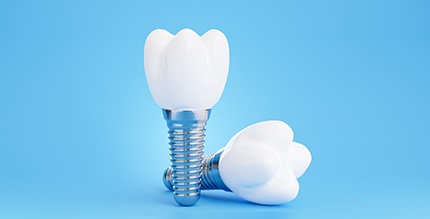
Not a good candidate for traditional dentures? Don’t worry – you have other options to explore! Some of those include:

If you’re missing an entire arch of teeth, whether in the top or bottom of your mouth, a full denture can restore the look of your smile. It is crafted using ceramic or acrylic teeth that are placed on a gum-colored base, which is made to look like your natural smile.
Once your dentist in Millersville has taken impressions of your mouth, the dental lab technicians will work to craft your dentures appropriately. Top dentures are made to cover the roof of the mouth while bottom dentures look like a horseshoe. This is to allow enough room for your tongue. Your natural suction is what holds them in place, but some patients opt to purchase an over-the-counter denture adhesive, too.

Partial dentures in Millersville are made to work alongside your natural teeth by replacing the missing teeth along the same arch. They work much like a puzzle piece and are crafted similarly to traditional full dentures.
A partial works to prevent natural teeth from shifting out of place, and it enables you to eat without worry. Using a metal clasp, the prosthetic is anchored to your natural teeth. This gives you a complete, natural-looking smile.

If you choose to get dentures, you can trust them to restore your smile. (Why else bother with them at all?) Still, they’ll only do their job well when given care. Dentures need daily maintenance to stay functional and help your grin. Without it, the prosthetics will fail early. Fortunately, Transcendent Smiles can help: below are some great tips on caring for dentures. Applying them will let your new teeth last a long time! For other details you might need, call our office.
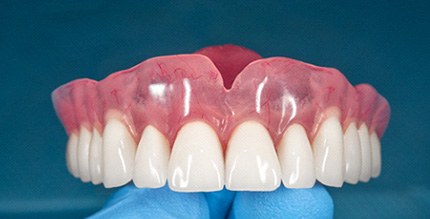
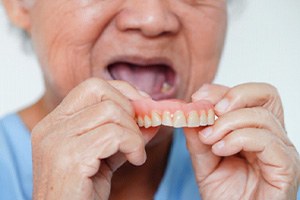
Firstly, remember to rinse your denture after meals. Doing so keeps food and plaque from sticking to them. As a result, the habit will lower your risk of dental issues.
That said, avoid hot water for the rinses. High temperatures can warp denture material. Therefore, a steamy rinse could ruin your denture’s fit.
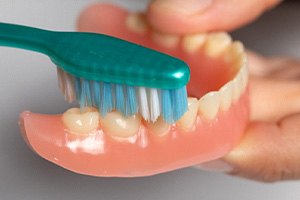
Aside from post-meal rinses, always give dentures once-daily cleanings. These sessions remove germs and debris that you’d otherwise miss.
Such a cleaning is pretty simple. Once the dentures are out of your mouth, brush them with a toothbrush and some hand soap. (However, avoid normal toothpaste; it’s abrasive and erodes dentures.) You should then soak the prosthetics if there’s time. In the end, rinse the dentures before returning them to your mouth.
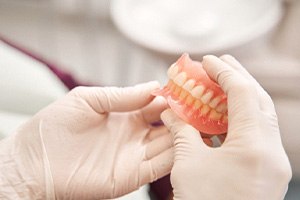
Sadly enough, dentures aren’t invincible. They can break or fracture under strong forces. Given that fact, you should keep dentures safe when they’re not in use.
There are several great ways to protect dentures. For instance, you might place a towel in your sink during a daily cleaning. (This action would cushion dentures from falls.) Another idea is to store dentures securely in a case. That way, roughhousing pets or children won't break your artificial teeth.
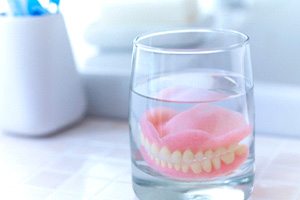
You shouldn’t wear dentures to bed, no matter how lifelike they are. The better action is to remove them before you sleep. Ideally, you could place them in a soaking solution overnight.
You see, constant denture use damages your health. It restricts gum circulation and irritates your various mouth tissues. This habit also increases your tongue’s plaque levels, thus raising your risk of tooth decay and gum disease. Wearing dentures overnight can even lead to pneumonia.
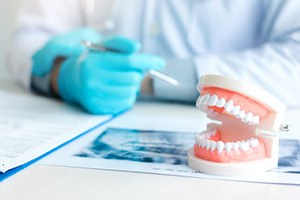
After you start wearing dentures, watch for any changes in them or your mouth. These shifts might cause problems that need a dentist’s help. Conditions you might notice include mouth sores, gum irritation, and infections.
You’ll especially need a dentist if your dentures fit poorly or get damaged. After all, trying to fix them yourself will make things worse. Meanwhile, a qualified dentist will refit or replace the prosthetics.
Since they aren’t removable, caring for All-on-4 dentures involves different methods. These include the following:

Each denture is completely personalized for the patient who will be wearing it. The process involves multiple steps and requires the help of experts at a separate dental laboratory. Would you like to know more about how your new prosthesis will be made? Our team would be happy to review the steps with you when you visit our office, but the information below can give you a solid foundation to start with.
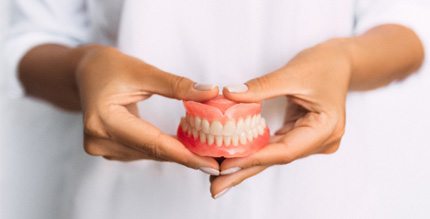
The base of the denture – the foundation that supports the replacement teeth – can be made out of acrylic, nylon, and other materials depending on the situation. Acrylic is typically the most common choice when it comes to full dentures, as it can be designed to resemble the natural soft tissues in your mouth.
When it comes to the artificial teeth of the denture, you’ll naturally want them to be made out of a material that can mimic real tooth enamel as closely as possible. Porcelain can often be an excellent option; not only is it aesthetically pleasing, but it can be counted on to last a long time.
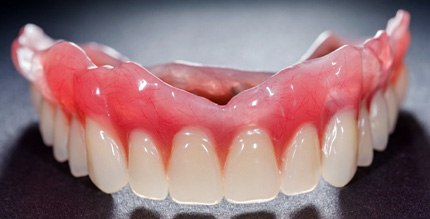
The process of creating dentures will begin with our team capturing the necessary impressions of your upper and lower gums. Said impressions will allow us to make a model of your mouth, which will then be sent to a dental laboratory, where technicians will start making your prosthesis.
A wax replica of your gums will be made, and the necessary number of false teeth will be placed. These wax dentures will be sent back to our practice. We’ll confirm that they fit in your mouth before sending them back to the lab.
The wax dentures will be placed in a special flask. Then hot water will be used to melt away the wax while the flask ensures that the dentures retain their shape. Acrylic material will be injected into the flask in order to act as the new base for the dentures.
Once the prosthesis is carefully removed, an ultrasonic bath will be utilized to get rid of any plaster that may have been left behind. Unnecessary acrylic will be removed, and the replacement teeth will be polished. Once our office has received the final dentures, we’ll set up one last appointment so that we can make sure that they fit in your mouth.

Trying to eat and speak with dentures may feel a bit unusual at first, and your gums may feel a little sore initially. It’s important to wear your dentures regularly so that your mouth adjusts as quickly as possible. It may make things easier if you only eat soft foods and take the time to give the muscles in your face some exercise. Please get in touch with us right away if the discomfort caused by new dentures doesn’t seem to be getting any better.
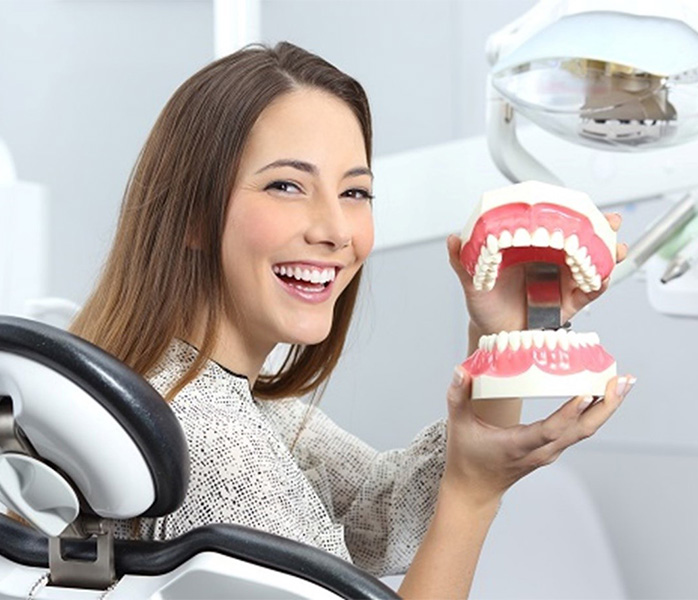
Whether you’re missing several, one arch, or even both arches of your pearly whites, you probably know all too well just how difficult daily tasks like biting, chewing, and even speaking can become. Fortunately, dentures are among the best solutions for addressing the lost oral functionality that results from missing teeth, and for many patients, the prospect of having a newly rebuilt and improved smile is quite enticing! Here are some of the exceptional benefits that patients with dentures have access to so that you can head into the future knowing that your smile will serve you exceptionally well!

Your teeth serve multiple purposes and aren’t solely tools for biting and chewing food; they’re also a huge contributor to your overall happiness and sense of confidence. People with missing teeth often have trouble accepting their tooth loss, and this has a negative impact on their self-esteem and how they present themselves. They might even hide their smiles from others, or prolong addressing the issue! But patients who receive dentures immediately experience an increase in confidence, which translates into more positive social interactions and increased feelings of acceptance.

Your teeth also play a very crucial role in speech and enunciation. This is because your lips and tongue rely on the position of your teeth to make certain sounds, so if you have missing teeth, there’s a good chance that you struggle to pronounce certain words or simply converse in general. But upon receiving dentures and making it through their initial adjustment phase (which usually lasts around a month or two), you’ll be speaking clearly and with elegance in no time!

Simply put, if you can’t chew your food, your nutrition will suffer. Not chewing your food thoroughly can lead to indigestion and malnutrition, not to mention that certain foods are already pretty tough in texture and hard to chew. But since dentures greatly enhance your chewing capabilities and provide you with prosthetic replacement teeth, you’ll be able to bite and chew your food, optimize your diet, and enjoy eating again with relative ease. This means that all of those hearty and healthy fruits and vegetables that are normally tough to eat won’t give you any trouble at all!

Tooth loss can cause all sorts of problems for a person, but perhaps the two most notable ones are further tooth loss and jawbone resorption. When you have gaps in your smile due to missing teeth, your remaining teeth can actually shift toward the open spaces and fall out themselves. Additionally, since these areas without teeth now lack the stimulation provided by your tooth roots, your jaw can begin to shrink and deteriorate. But by getting dentures, you can enjoy a complete smile that isn’t threatened by these issues since they’ll replace teeth and the corresponding jawbone stimulation provided by them.

Since your smile is the first feature that strangers notice about you, needless to say, it plays an important part in making positive first impressions—which can greatly benefit you and expand your opportunities! In fact, research shows that the probability of being employed significantly increases when you have a healthy and attractive smile. Not to mention, people will also feel inclined to approach you or feel comfortable around you, since you’ll exude confidence. For this reason, dentures can literally provide your career with a nice boost and give you an edge in the professional world.

Now two smiles are the same, meaning the cost of dentures in Millersville can vary significantly from person to person. At your consultation, our dentist will share which factors affect the final price and perform an oral examination to give you an accurate cost estimate. Based on our findings, we’ll help you understand not only what you can expect to pay for your new smile, but what your future dentures will look and feel like.

When estimating the final cost of your new dentures in Millersville, there are several factors you must take into consideration. Here are a few major elements that can influence the price of your oral appliances:
Some people may be tempted to opt for cheaper dentures as a way to save money. However, they’re not necessarily the ideal option. These oral appliances are often made of subpar acrylic or “teeth” and tend to break easily, meaning they’ll require replacement much sooner than you’d expect. When it comes to dental work, quality should always be of utmost importance regardless of cost.

Short answer: yes, they’re typically more expensive than traditional dentures. However, there’s a good reason for that. Implant dentures require oral surgery and the placement of multiple dental implants, making them one of the most permanent solutions for missing teeth. With this method, you can expect to reap numerous benefits like a fully restored bite, a boost of confidence, and preserved facial structure. Because implant dentures are designed to last decades, many patients find they’re a worthwhile investment that pays off in the long run.

Since dentures are considered a major procedure, most dental insurance plans will offer some level of coverage for it. In many cases, they’ll cover around 50% of the final cost. Of course, the exact amount of coverage varies from person to person depending on their unique plan. If you’re not sure what your policy covers, our dental team can review the details and explain how your plan works. We’ll do everything possible to maximize your benefits and reduce your out-of-pocket expenses significantly.

Don’t have dental insurance? No problem. We offer an in-house financing plan to help make your dental bills easier to manage. With our plans, you can break up your out-of-pocket costs into budget-friendly monthly installments. We’ll tailor your plan to fit your exact budget, so you can receive and pay for the care you need without having to break the bank.
If you want to know more about your financing options, don’t hesitate to contact our team at Transcendent Smiles and schedule a consultation. We’ll gladly answer any questions you have and help you get started on your journey towards your new smile!
When you start getting ready for your new life with dentures, Dr. Tran will be there to answer all your questions and make sure you have the information you need to make the best possible decisions. It’s a good idea to write down any concerns you have before you come in for your first appointment. Below are some common examples of things people have on their minds before getting new teeth.
When you first receive your dentures, you’ll usually need to wear them for 24 hours straight to help your mouth adjust to them. This means you’ll have to sleep with them during the first night. After that, though, you should be removing your dentures every evening. The appliance restricts the blood circulation in your gums and causes irritation; it’s best to give your mouth a chance to rest and recover during the night. This also lowers the risk of bacteria breeding in the dark, moist space between the dentures and the soft tissue; plaque has a tendency to build up in greater amounts when the dentures are worn for too long.
Many people assume that only older patients are eligible for dentures, but in reality your candidacy for false teeth is based on need, not age. It’s true that tooth loss is more common among adults between the ages of 40 and 64 compared to those between the ages of 20 and 39; moreover, nearly 57% of people ages 65 to 74 wear a partial or full denture. However, some younger adults can still lose their teeth due to accidents and poor oral hygiene, while plenty of older people are able to keep their natural teeth for the rest of their lives. We’ll recommend dentures based on your own unique situation.
Speaking with dentures is slightly different compared to speaking with natural teeth, so you’ll have to give yourself time to adapt. It’s important to get as much practice speaking as possible so that you can overcome speech impediments and other possible hiccups that much sooner. Also, you may need to make some changes to your diet. Sticky foods like peanut butter can pull dentures out of place, and hard foods like raw carrot sticks could damage them. You should avoid such foods as much as possible.
It depends on several factors. For starters, you might have to get your remaining teeth extracted before receiving full dentures, and the cost of that procedure depends on the exact number of teeth involved. This step isn’t normally necessary for partial dentures, and the final price will reflect that. If you get implant-retained dentures, you’ll also have to account for the costs of implant surgery. Long story short: the ultimate cost of the denture process as a whole can vary significantly, and we’ll need to examine your mouth and consider your options before providing an estimate.